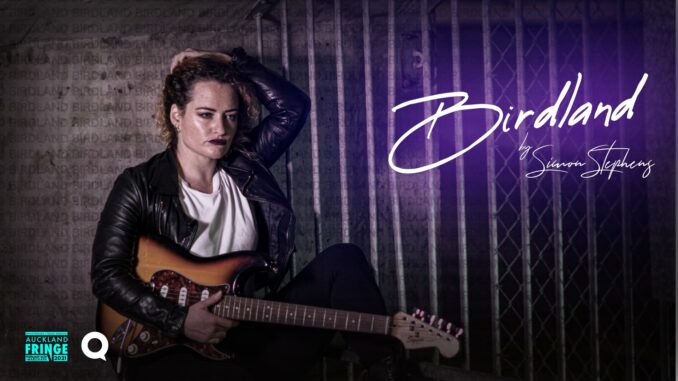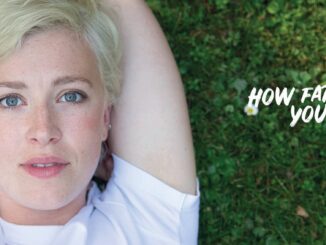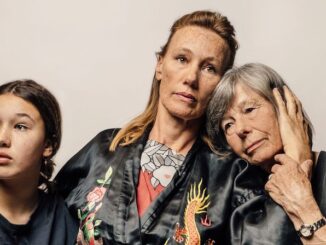
[Back in the Cage]
Content Notification: Sexual Assault
Did you hear about the big star whose only friend is his lawyer? The former sitcom actor who attends a homophobic church? The Oscar nominee who has his own cult? The square jawed wannabe leading man who’s into non-consensual cannibal fantasies?
Well, of course you have.
Celebrity was once this unknowable, almost ethereal state of being, but we’re almost too familiar with these people and their issues now. So much so we celebrate any big name who seems in any sense a normal person (never change, Keanu). The dysfunction of the very famous is pretty well ubiquitous at this point. We’re inured to it. So what does Simon Stephens’ Birdland, about a noxious, abusive rock star who eventually pisses away his career, have to add exactly?
Birdland sees musician Paul (Cherie Moore) embarking on the last leg of a world tour. He may be at the peak of his fame, but as a person he’s already circling the drain and whatever charm or wit might have enabled him to obtain this level of notoriety has curdled into cruelty and narcissism. From the get-go he’s a fairly resistible figure and hits rock bottom rapidly when he sleeps with best friend and bandmate Johnny’s (Jonathan James) girlfriend, possibly causing her suicide. Paul largely gets away with it, as you’d expect from a star of his apparent stature, but finds guilt and self-loathing creeping in as the tour goes on.
Stephens’ script accurately captures the fatiguing blur of touring, one scene flowing rapidly into the next often with little sense of where or when we are now. This is well represented in George Wallace’s set, strewn with wheeled road cases and platforms sweeping Paul from one fleeting encounter to the next, a lazy cascade of posters at the back of Q’s Rangatira spelling out the unkempt and sprawling nature of his celebrity. The script and production work hand in hand to give us a sense of the transient, unstable world this star inhabits.
But Birdland’s big issue isn’t in how well it depicts Paul’s life, but the monotony of its story. We get what feels like an endless series of vignettes in which Paul is a bastard towards some member of the ensemble. As almost the sole focus of the show, the only character really afforded any interiority, he’s an exhausting presence and after a while you start to wonder what else we can possibly learn from his numbing, repetitious escapades other than that, yes, being famous isn’t all it’s cracked up to be. Moore brings plenty of swagger and confidence to the part but rarely finds a way to vary the material and her wide-eyed, fast talking routine ends up with nowhere to go as the show winds on. What’s interesting about any of this? What’s unfamiliar?
Birdland was first staged in 2014 and it feels like since then we really should have moved on from any fascination with abusers. I felt my patience wearing thin before the halfway mark. Paul may have held more interest when Birdland debuted, but after the Weinsteins, Depps, Hammers, Spaceys, LaBeouf’s etc etc of the world have been unmasked it feels tiring to have to spend yet more time with this type of figure. Who cares what makes him tick? Who cares about the dreary pitfalls of his fame? It says a lot that, having already had his protagonist kill a woman, Stephens can’t think of anywhere else to go at the end but to have him (supposedly accidentally) rape a 14 year old. There’s nowhere to go but down, no dramatic potential here other than further, sicker exploitation. By the time Paul delivers his final monologue in which he makes a claim for immortality it feels like a sad joke. Yes, there will always be more of this breed of monster and it’s sad we still consider it worthy of such investigation.
There is, in addition to this, the curious choice of casting Moore in the lead role. I’m not certain whether I was supposed to take this as her playing Paul as a man or if the intention was to actually flip the characters’ gender from what Stephens originally wrote. I will say that whichever is the intended reading here it adds a strange additional dimension to Birdland’s politics, putting all these crimes usually seen committed by men onto a woman instead, as if this will alleviate the uncomfortable associations with real events. Admittedly this isn’t the only interpretation possible here, but too little is done with gender swap to really make it count for much.
There are bright moments that pop up. A scene between Paul and his elderly father (Michael Hurst) provides a poignant twist to Paul’s obsession with the power of money. Mel Odedra does great work in all the parts he plays, particularly a grieving father. Indeed, the ensemble players, also including Fiona Helen Armstrong, Jacob Dale and Jessie Lawrence, do good work all round with what scant material they’re given and the slick production is a credit to director Jordan Dickson. Yet Birdland still feels like a relic of a very different time when it maybe felt more justified to hand-wring over the souls of the rich and toxic. “Is there any coming back? Is there a point where someone’s humanity is so corrupted that it’s gone forever?” Dickson asks in his director’s note.
Yes. We should be clear on that by now.
Birdland played Q Rangatira 26-27 February, 2021.




Leave a Reply